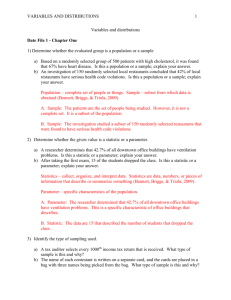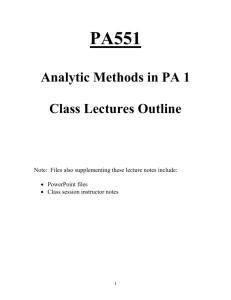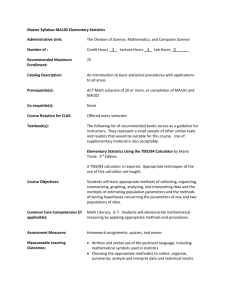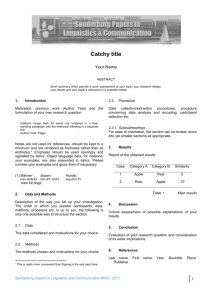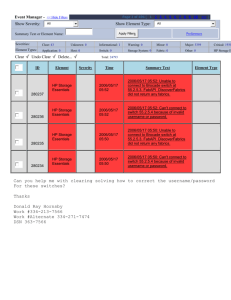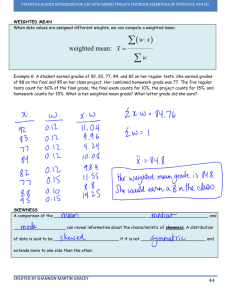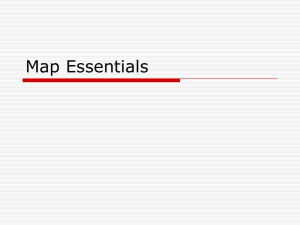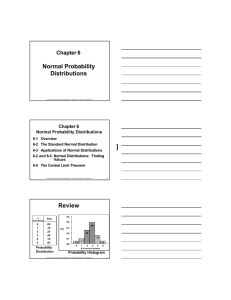8-3 Testing a Claim about a Proportion
advertisement
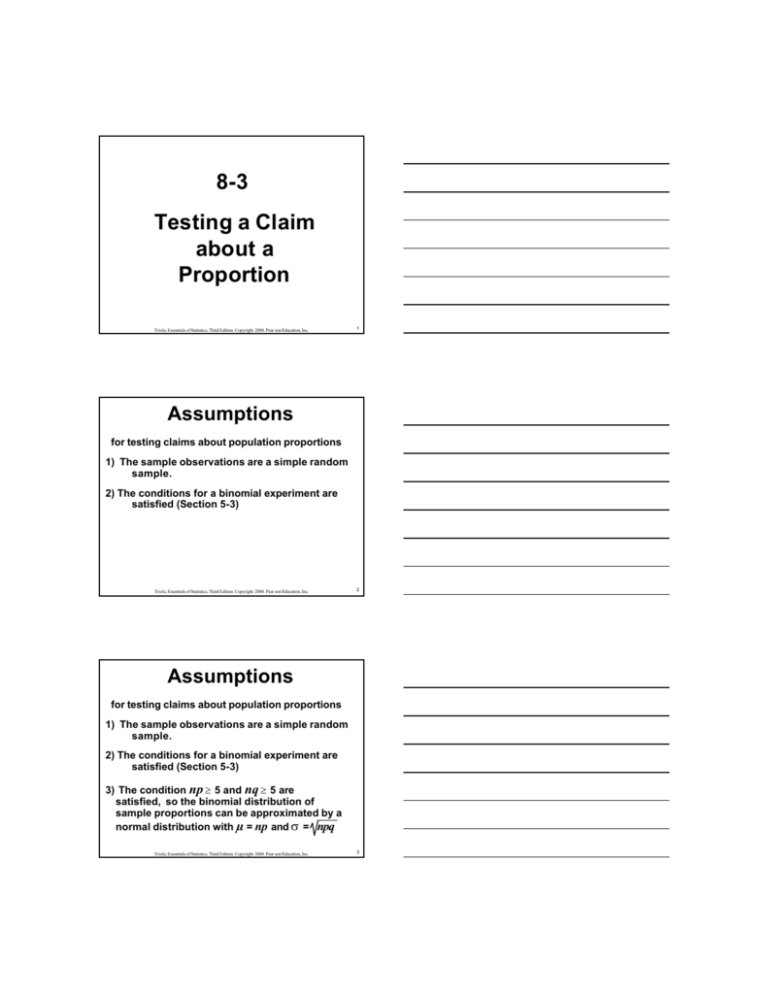
8- 3 Testing a Claim about a Proportion Triola,, Essentials of Statistics, Third Edition. Copyright 2008. Pear son/Education, Inc. Triola 1 Assumptions for testing claims about population proportions 1) The sample observations are a simple random sample. 2) The conditions for a binomial experiment are satisfied (Section 55- 3) Triola,, Essentials of Statistics, Third Edition. Copyright 2008. Pear son/Education, Inc. Triola 2 Assumptions for testing claims about population proportions 1) The sample observations are a simple random sample. 2) The conditions for a binomial experiment are satisfied (Section 55- 3) 3) The condition np ≥ 5 and nq ≥ 5 are satisfied, so the binomial distribution of sample proportions can be approximated by a normal distribution with µ = np and σ = npq Triola,, Essentials of Statistics, Third Edition. Copyright 2008. Pear son/Education, Inc. Triola 3 Notation n = number of trials Triola,, Essentials of Statistics, Third Edition. Copyright 2008. Pear son/Education, Inc. Triola 4 Notation n = number of trials ∧ p = x/n (sample proportion) p = population proportion (used in the null hypothesis) q =1 -p Triola,, Essentials of Statistics, Third Edition. Copyright 2008. Pear son/Education, Inc. Triola 5 Test Statistic for Testing a Claim about a Proportion ∧ z= p-p pq n Triola,, Essentials of Statistics, Third Edition. Copyright 2008. Pear son/Education, Inc. Triola 6 Test Statistic for Testing a Claim about a Proportion ∧ z= p-p pq n Critical values and PP- values: Use Table AA- 2 Triola,, Essentials of Statistics, Third Edition. Copyright 2008. Pear son/Education, Inc. Triola 7 CAUTION ∧ When the calculation of p results in a decimal with many places, do not round too severely when evaluating the z test statistic. Triola,, Essentials of Statistics, Third Edition. Copyright 2008. Pear son/Education, Inc. Triola 8 Traditional Method Same as described in Sections 8-2 and in Figure 8-9 Triola,, Essentials of Statistics, Third Edition. Copyright 2008. Pear son/Education, Inc. Triola 9 Comprehensive Hypothesis Test Triola,, Essentials of Statistics, Third Edition. Copyright 2008. Pear son/Education, Inc. Triola 10 Example: It was found that 821 crashes of midsize cars equipped with air bags, 46 of the crashes resulted in hospitalization of the drivers. Using the 0.01 significance level, test the claim that the air bag bag hospitalization is lower than the 7.8% rate for cars with automatic automatic safety belts. Triola,, Essentials of Statistics, Third Edition. Copyright 2008. Pear son/Education, Inc. Triola 11 Example: It was found that 821 crashes of midsize cars equipped with air bags, 46 of the crashes resulted in hospitalization of the drivers. Using the 0.01 significance level, test the claim that the air bag bag hospitalization is lower than the 7.8% rate for cars with automatic automatic safety belts. np = (821)(0.078) > 5 nq = (821)(0.922) > 5 Triola,, Essentials of Statistics, Third Edition. Copyright 2008. Pear son/Education, Inc. Triola 12 Example: It was found that 821 crashes of midsize cars equipped with air bags, 46 of the crashes resulted in hospitalization of the drivers. Using the 0.01 significance level, test the claim that the air bag bag hospitalization is lower than the 7.8% rate for cars with automatic automatic safety belts. Claim: p < 0.078 H0: p = 0.078 H1: p < 0.078 Triola,, Essentials of Statistics, Third Edition. Copyright 2008. Pear son/Education, Inc. Triola 13 Example: It was found that 821 crashes of midsize cars equipped with air bags, 46 of the crashes resulted in hospitalization of the drivers. Using the 0.01 significance level, test the claim that the air bag bag hospitalization is lower than the 7.8% rate for cars with automatic automatic safety belts. Claim: p < 0.078 ∧ p = 46 / 821 = 0.0560 H0: p = 0.078 H1: p < 0.078 Triola,, Essentials of Statistics, Third Edition. Copyright 2008. Pear son/Education, Inc. Triola 14 Example: It was found that 821 crashes of midsize cars equipped with air bags, 46 of the crashes resulted in hospitalization of the drivers. Using the 0.01 significance level, test the claim that the air bag bag hospitalization is lower than the 7.8% rate for cars with automatic automatic safety belts. Claim: p < 0.078 ∧ p = 46 / 821 = 0.0560 H0: p = 0.078 H1: p < 0.078 α = 0.01 p = 0.078 z = - 2.33 Triola,, Essentials of Statistics, Third Edition. Copyright 2008. Pear son/Education, Inc. Triola 15 Example: It was found that 821 crashes of midsize cars equipped with air bags, 46 of the crashes resulted in hospitalization of the drivers. Using the 0.01 significance level, test the claim that the air bag bag hospitalization is lower than the 7.8% rate for cars with automatic automatic safety belts. Claim: p < 0.078 ∧ p = 46 / 821 = 0.0560 H0: p = 0.078 H1: p < 0.078 ∧ z= p-p pq n = 0.056 - 0.078 (0.078 )(0.922) ≈ - 2.35 821 α = 0.01 p = 0.078 z = - 2.33 Triola,, Essentials of Statistics, Third Edition. Copyright 2008. Pear son/Education, Inc. Triola 16 Example: It was found that 821 crashes of midsize cars equipped with air bags, 46 of the crashes resulted in hospitalization of the drivers. Using the 0.01 significance level, test the claim that the air bag bag hospitalization is lower than the 7.8% rate for cars with automatic automatic safety belts. Claim: p < 0.078 ∧ p = 46 / 821 = 0.0560 H0: p = 0.078 H1: p < 0.078 ∧ z= p-p pq n = 0.056 - 0.078 (0.078 )(0.922) ≈ - 2.35 821 α = 0.01 p = 0.078 z = - 2.33 z = - 2.35 Triola,, Essentials of Statistics, Third Edition. Copyright 2008. Pear son/Education, Inc. Triola 17 Example: It was found that 821 crashes of midsize cars equipped with air bags, 46 of the crashes resulted in hospitalization of the drivers. Using the 0.01 significance level, test the claim that the air bag bag hospitalization is lower than the 7.8% rate for cars with automatic automatic safety belts. Claim: p < 0.078 ∧ p = 46 / 821 = 0.0560 H0: p = 0.078 H1: p < 0.078 ∧ z= p-p pq n = 0.056 - 0.078 (0.078 )(0.922) ≈ - 2.35 821 α = 0.01 ∧ p = 0.056 p = 0.078 z = - 2.33 z = - 2.35 Triola,, Essentials of Statistics, Third Edition. Copyright 2008. Pear son/Education, Inc. Triola 18 Example: It was found that 821 crashes of midsize cars equipped with air bags, 46 of the crashes resulted in hospitalization of the drivers. Using the 0.01 significance level, test the claim that the air bag bag hospitalization is lower than the 7.8% rate for cars with automatic automatic safety belts. Claim: p < 0.078 ∧ p = 46 / 821 = 0.0560 H0: p = 0.078 reject H 0 H1: p < 0.078 ∧ z= p-p pq n = 0.056 - 0.078 (0.078 )(0.922) ≈ - 2.35 821 α = 0.01 ∧ p = 0.056 p = 0.078 z = - 2.33 z = - 2.35 Triola,, Essentials of Statistics, Third Edition. Copyright 2008. Pear son/Education, Inc. Triola 19 Example: It was found that 821 crashes of midsize cars equipped with air bags, 46 of the crashes resulted in hospitalization of the drivers. Using the 0.01 significance level, test the claim that the air bag bag hospitalization is lower than the 7.8% rate for cars with automatic automatic safety belts. Claim: p < 0.078 ∧ p = 46 / 821 = 0.0560 H0: p = 0.078 reject H 0 H1: p < 0.078 ∧ z= p-p pq n = 0.056 - 0.078 α = 0.01 ∧ p = 0.056 z = - 2.35 p = 0.078 z = - 2.33 (0.078 )(0.922) ≈ - 2.35 821 There is sufficient evidence to support claim that the air bag hospitalization rate is lower than the 7.8% rate for automatic safety belts. Triola,, Essentials of Statistics, Third Edition. Copyright 2008. Pear son/Education, Inc. Triola 20 P-Value Method Same as described in Section 88- 2 and Figure 88-8 Reject the null hypothesis if the P-value is less than or equal to the significance level α . Triola,, Essentials of Statistics, Third Edition. Copyright 2008. Pear son/Education, Inc. Triola 21 P-Value Method Same as described in Section 88- 2 and Figure 88-8 Test Statistic: - 2.35 P- Value of Test Statistic: 0.0094 α = 0.01 0.0094 < 0.01 REJECT the Ho Triola,, Essentials of Statistics, Third Edition. Copyright 2008. Pear son/Education, Inc. Triola 22 Confidence Interval Method Same as described in Section 88- 2 and Table 88-2 Reject the null hypothesis if the confidence interval does not contain the population parameter. Triola,, Essentials of Statistics, Third Edition. Copyright 2008. Pear son/Education, Inc. Triola 23 Confidence Interval Method Same as described in Section 88- 2 and Table 88-2 ∧ If p = 0.0560 and α = 0.01, the confidence interval would be: 0.0353 < p < 0.0767 Reject the claim since this interval does not contain the claimed proportion 0.078. Triola,, Essentials of Statistics, Third Edition. Copyright 2008. Pear son/Education, Inc. Triola 24 ∧ p sometimes is given directly “10% of the observed sports cars are red” red” is expressed as ∧ p = 0.10 Triola,, Essentials of Statistics, Third Edition. Copyright 2008. Pear son/Education, Inc. Triola 25 ∧ p sometimes is given directly “10% of the observed sports cars are red” red” is expressed as ∧ p = 0.10 ∧ p sometimes must be calculated “96 surveyed households have cable TV and 54 do not” not” is calculated using Triola,, Essentials of Statistics, Third Edition. Copyright 2008. Pear son/Education, Inc. Triola 26 ∧ p sometimes is given directly “10% of the observed sports cars are red” red” is expressed as ∧ p = 0.10 ∧ p sometimes must be calculated “96 surveyed households have cable TV and 54 do not” not” is calculated using ∧ 96 p = nx = (96+54) = 0.64 (determining the sample proportion of households with cable TV) Triola,, Essentials of Statistics, Third Edition. Copyright 2008. Pear son/Education, Inc. Triola 27 Test Statistic for Testing a Claim about a Proportion z= ∧ p-p pq n Triola,, Essentials of Statistics, Third Edition. Copyright 2008. Pear son/Education, Inc. Triola 28 Test Statistic for Testing a Claim about a Proportion z= ∧ p-p pq n - np = z = xσ- µ= xnpq x np n n npq n ∧ = ppq- p n Triola,, Essentials of Statistics, Third Edition. Copyright 2008. Pear son/Education, Inc. Triola 29 Example: In a recent year, of the 109,857 arrests for Federal offenses, 29.1% were for drug offenses (based on data from the U.S. Department of Justice). Use the 0.01 significance level to test the claim that the drug offense rate is equal to 30%. How can the result be explained, given that the 29.1% appears to be so close to 30%. Triola,, Essentials of Statistics, Third Edition. Copyright 2008. Pear son/Education, Inc. Triola 30 Triola,, Essentials of Statistics, Third Edition. Copyright 2008. Pear son/Education, Inc. Triola 31
